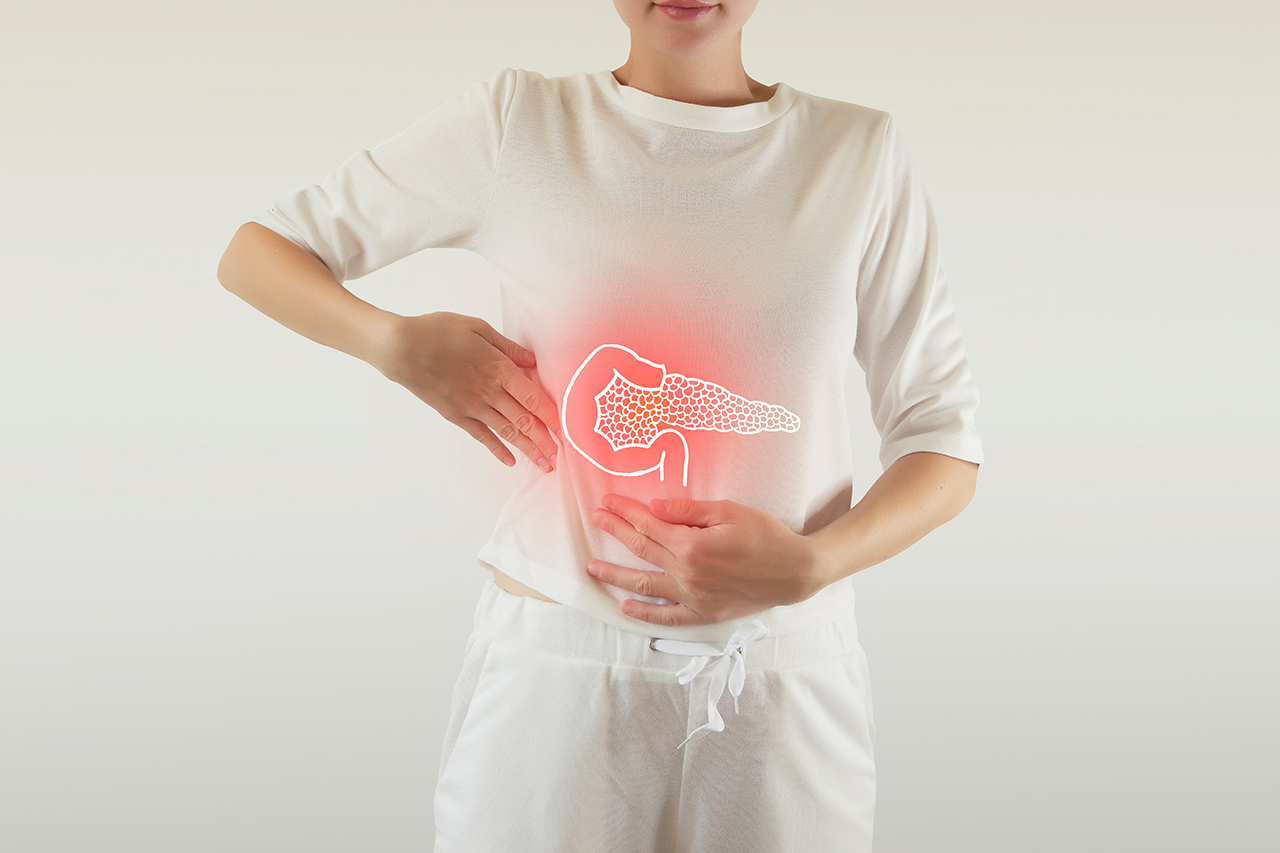Many health conditions are linked to heavy alcohol consumption or worsened by heavy drinking. Research has also linked pancreatitis and alcohol. Considering how common drinking alcohol is in the United States (85.6 of Americans 18 and older drank alcohol at some point in 2019), it’s worth exploring the symptoms and causes of alcohol-induced pancreatitis.
How the Pancreas Works
Long-term and excessive alcohol consumption can cause pancreatitis and contribute to worsening symptoms. Alcohol-induced pancreatitis refers to inflammation of the pancreas aggravated by alcohol.
The pancreas is an organ about the size of your hand that’s located inside your abdomen just behind your stomach. The primary role of the pancreas is to aid in digestion.
During digestion, your pancreas creates pancreatic juices called enzymes. These enzymes are responsible for breaking down sugars, fats, and starches to help you digest them properly.
There are three main types of pancreatic enzymes:1,2
- Lipase: These enzymes work with bile, which is produced by the liver, to break down fat in the food you eat. If you don’t have enough lipase, your body will struggle to absorb fat and important vitamins (A, D, E, and K).
- Protease: These enzymes break down proteins in the food you eat. They also help protect you from germs that may live in the intestines.
- Amylase: This enzyme helps break down starches into sugar that the body can use for energy. Without enough amylase, you may experience gastrointestinal problems like diarrhea from undigested carbohydrates (sugars)
The pancreas also helps your digestive system function by creating hormones. Unlike enzymes, hormones are released into your bloodstream and carry messages to other parts of your digestive system.
Common pancreatic hormones include:2
- Insulin: Insulin is the hormone that helps your body use sugar (glucose) for energy and is made in pancreatic cells called beta cells. Without enough insulin, sugar levels rise in your bloodstream, causing diabetes.
- Glucagon: Alpha cells in the pancreas produce glucagon, which helps raise your blood sugar levels when they drop too low by sending a message to the liver to release stored sugar.
- Gastrin and amylin: Although gastrin is mostly made in the neuroendocrine cells (also called G-cells) in your stomach, the pancreas also makes some. Gastrin is a hormone that stimulates your stomach to make gastric acid, while amylin helps to control appetite and keep the stomach from emptying.
Questions about our Programs?
Our admissions coordinators are available 24/7 to answer any questions you may have as you consider whether treatment at Banyan is right for you or your loved one.
How Does Alcohol Cause Pancreatitis?
While the causes remain unclear, it’s believed that alcohol causes pancreatitis because of its effects on small pancreatic ducts and cells called acinar cells. According to research, alcohol is believed to cause precipitation in the pancreas (formation of protein plugs or precipitates and calcified stones in ducts) and increase the rate of pancreatic secretions, which contributes to the formation of protein plugs in small ducts.3
This then causes calcified stones to form, which leads to worsening inflammation and fibrosis. In its attempt to rid itself of alcohol, pancreatic acinar cells metabolize alcohol into toxic byproducts that damage pancreatic ducts and enzymes that are normally released into the digestive tract build up and begin to digest or eat at the pancreas itself, a process known as autodigestion. Basically, this is when pancreatic enzymes destroy their own tissue, causing inflammation.
Alcoholic Pancreatitis Symptoms
Common symptoms of acute alcoholic pancreatitis include:
- Severe abdominal pain
- Swollen and tender abdomen
- Increased heart rate
- Low blood pressure
- Fever
- Jaundice (yellowing of the skin and whites of the eyes)
- Nausea and/or vomiting
- Loss of appetite
- Back pain
Chronic alcoholic pancreatitis usually occurs as a result of repeated acute pancreatitis episodes. Ongoing alcoholism is the single most common risk factor for chronic pancreatitis.
Chronic pancreatitis may produce more severe symptoms, such as recurrent abdominal pain accompanied by nausea and weight loss. Due to the damage done to the pancreas, the secretion of enzymes needed for proper fat absorption and digestion is damaged, causing permanent damage to digestive function.
There’s also an increased risk of diabetes in people with alcoholic pancreatitis due to the destruction of ?-cells (beta cells), which produce, store, and release insulin in the pancreas.
Other common symptoms of chronic alcohol pancreatitis include:
- Pain in the upper abdomen that spreads into the back
- Stomach pain that worsens when you eat or drink alcohol
- Nausea and/or vomiting
- Back pan
- Pale skin
- Greasy, floating, and foul-smelling bowel movements
- Onset of diabetes
- Jaundice (yellowing of the skin and whites of the eyes)
Untreated pancreatitis can cause permanent damage, meaning that it won’t be able to produce the enzymes and hormones your body needs to regulate digestion, sugar levels, and more. If you recognize the symptoms of alcohol-induced pancreatitis in yourself or a loved one, get help right away.
How Much Alcohol Causes Pancreatitis?
Chronic alcohol consumption causes 17% to 25% of acute pancreatitis cases worldwide and is the second most common cause of acute pancreatitis after gallstones.3 Alcohol-induced pancreatitis usually occurs in people with five or more years of persistent, heavy drinking habits (4 to 5 drinks per week) and rarely occurs in binge drinkers.
Chronic alcohol consumption (not acute) is the single most common cause of chronic pancreatitis, playing a role in 40% to 70% of cases.3 The more and longer a person drinks, the more likely they are to experience acute alcoholic pancreatitis, chronic pancreatitis (which remains for the rest of your life), and even pancreatic cancer.
Get a Free Insurance Verification Today!
"*" indicates required fields
Need Alcoholism Treatment?
Because most cases of alcohol pancreatitis are caused by chronic alcohol consumption, finding treatment for an ongoing addiction is equally as important as treating the condition itself. Alcohol addiction or alcohol use disorder is a chronic disease that requires comprehensive treatment and aid from a team of professionals with years of experience.
If you or someone you care about has become addicted to alcohol and is heading down a dangerous path, our Palm Beach rehab can help. We help patients recover from the initial symptoms of alcohol withdrawal with a medically monitored detox.
Alcohol is one of the most difficult substances to quit because of withdrawal symptoms, so we make sure that our patients are as safe and comfortable as possible during this process. Following detox, patients can then move on to alcohol addiction treatment, which includes various levels of care depending on the severity of the patient’s condition.
To learn more about our addiction treatment in Palm Beach, call Behavioral Health of the Palm Beaches today at 561-220-3981.
Related Reading:
Warning Signs of Alcohol Addiction
Social Anxiety Disorder and Alcohol Use: I’m SAD! I need a drink!
Sources:
- Britannica – Pancreas
- John Hopkins Medicine – The Digestive Process: What Is the Role of Your Pancreas in Digestion?
- NCBI – Alcoholic Pancreatitis













